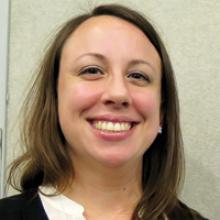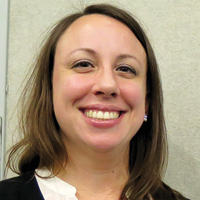User login
HOUSTON—Nearly one in three children diagnosed with new-onset epilepsy presents with psychiatric diagnoses at the onset, according to research presented at the 70th Annual Meeting of the American Epilepsy Society.
This finding “tells us that when kids are coming in, even if they are only having psychiatric symptoms at their onset of epilepsy, they should be referred for some treatment to help them possibly mitigate the development of these psychiatric diagnoses in the first year,” said Julia Doss, PsyD, Pediatric Psychologist at the Minnesota Epilepsy Group in Saint Paul.
About three years ago, the Minnesota Epilepsy Group, a private practice group that consults with the United Hospital and Children’s Hospitals and Clinics of Minnesota, launched a New Onset Pediatric Epilepsy (NOPE) clinic. At this clinic, referred patients undergo a psychologic evaluation, neuropsychologic testing, and medical evaluation in the same day. Psychologic assessment measures include the Clinical Interview with parent and patient, the Strengths and Difficulties Questionnaire (SDQ), and the Revised Children’s Anxiety and Depression Scale (RCADS).
Researchers evaluated 96 patients in the clinic who had presented for their first NOPE clinic visit within eight weeks of their epilepsy diagnosis. More than half were male, and patients ranged in age from 3 to 18. Dr. Doss and her colleagues separated the children into the following three groups: ages 3 to 6 (group 1), ages 7 to 11 (group 2), and ages 12 to 18 (group 3). Based on the Clinical Interview, none of the patients in group 1 screened positive for depression or anxiety, but 16% met criteria for some other behavioral disorder. However, among patients in group 2, the percentages who met criteria for depression, anxiety, and other behavioral disorders were 13%, 25%, and 13%, respectively. The corresponding percentages for patients in group 3 were 29%, 38%, and 10%.
Of the 96 patients evaluated, 64 parents completed all of the questions on the SDQ. The researchers observed significant correlations between parent response and diagnoses assigned on the Clinical Interview for behavior diagnoses and anxiety diagnoses) but not for depression diagnoses.
“Despite the correlations on both behavior and anxiety responses and clinical diagnoses assigned, parents still only reported significant concerns in about half of the children that were given diagnoses,” said Dr. Doss.
The comparison of RCADS scores between parent and child demonstrated moderate to strong correlation on the following scales: separation anxiety, generalized anxiety, obsessive/compulsive, and depression.
Small sample size was a key limitation in this study, said Dr. Doss. “Early evaluation or at least screening is necessary in all of our kids who present with an epilepsy diagnosis, because more than 30% develop psychiatric disorders within the first year of their diagnosis,” said Dr. Doss. “That’s one in three, so if we can start to better evaluate that early and get them funneled into treatment early, we might be able to prevent some of these problems from becoming lifelong issues.”
—Doug Brunk
Suggested Reading
Asato MR, Doss JL, Piloplys S. Clinic-friendly screening for cognitive and mental health problems in school-aged youth with epilepsy. Epilepsy Behav. 2015;48:97-102.
Piloplys S, Doss J, Siddarth P, et al. Risk factors for comorbid psychopathology in youth with psychogenic nonepileptic seizures. Seizure. 2016;38:32-37.
HOUSTON—Nearly one in three children diagnosed with new-onset epilepsy presents with psychiatric diagnoses at the onset, according to research presented at the 70th Annual Meeting of the American Epilepsy Society.
This finding “tells us that when kids are coming in, even if they are only having psychiatric symptoms at their onset of epilepsy, they should be referred for some treatment to help them possibly mitigate the development of these psychiatric diagnoses in the first year,” said Julia Doss, PsyD, Pediatric Psychologist at the Minnesota Epilepsy Group in Saint Paul.
About three years ago, the Minnesota Epilepsy Group, a private practice group that consults with the United Hospital and Children’s Hospitals and Clinics of Minnesota, launched a New Onset Pediatric Epilepsy (NOPE) clinic. At this clinic, referred patients undergo a psychologic evaluation, neuropsychologic testing, and medical evaluation in the same day. Psychologic assessment measures include the Clinical Interview with parent and patient, the Strengths and Difficulties Questionnaire (SDQ), and the Revised Children’s Anxiety and Depression Scale (RCADS).
Researchers evaluated 96 patients in the clinic who had presented for their first NOPE clinic visit within eight weeks of their epilepsy diagnosis. More than half were male, and patients ranged in age from 3 to 18. Dr. Doss and her colleagues separated the children into the following three groups: ages 3 to 6 (group 1), ages 7 to 11 (group 2), and ages 12 to 18 (group 3). Based on the Clinical Interview, none of the patients in group 1 screened positive for depression or anxiety, but 16% met criteria for some other behavioral disorder. However, among patients in group 2, the percentages who met criteria for depression, anxiety, and other behavioral disorders were 13%, 25%, and 13%, respectively. The corresponding percentages for patients in group 3 were 29%, 38%, and 10%.
Of the 96 patients evaluated, 64 parents completed all of the questions on the SDQ. The researchers observed significant correlations between parent response and diagnoses assigned on the Clinical Interview for behavior diagnoses and anxiety diagnoses) but not for depression diagnoses.
“Despite the correlations on both behavior and anxiety responses and clinical diagnoses assigned, parents still only reported significant concerns in about half of the children that were given diagnoses,” said Dr. Doss.
The comparison of RCADS scores between parent and child demonstrated moderate to strong correlation on the following scales: separation anxiety, generalized anxiety, obsessive/compulsive, and depression.
Small sample size was a key limitation in this study, said Dr. Doss. “Early evaluation or at least screening is necessary in all of our kids who present with an epilepsy diagnosis, because more than 30% develop psychiatric disorders within the first year of their diagnosis,” said Dr. Doss. “That’s one in three, so if we can start to better evaluate that early and get them funneled into treatment early, we might be able to prevent some of these problems from becoming lifelong issues.”
—Doug Brunk
Suggested Reading
Asato MR, Doss JL, Piloplys S. Clinic-friendly screening for cognitive and mental health problems in school-aged youth with epilepsy. Epilepsy Behav. 2015;48:97-102.
Piloplys S, Doss J, Siddarth P, et al. Risk factors for comorbid psychopathology in youth with psychogenic nonepileptic seizures. Seizure. 2016;38:32-37.
HOUSTON—Nearly one in three children diagnosed with new-onset epilepsy presents with psychiatric diagnoses at the onset, according to research presented at the 70th Annual Meeting of the American Epilepsy Society.
This finding “tells us that when kids are coming in, even if they are only having psychiatric symptoms at their onset of epilepsy, they should be referred for some treatment to help them possibly mitigate the development of these psychiatric diagnoses in the first year,” said Julia Doss, PsyD, Pediatric Psychologist at the Minnesota Epilepsy Group in Saint Paul.
About three years ago, the Minnesota Epilepsy Group, a private practice group that consults with the United Hospital and Children’s Hospitals and Clinics of Minnesota, launched a New Onset Pediatric Epilepsy (NOPE) clinic. At this clinic, referred patients undergo a psychologic evaluation, neuropsychologic testing, and medical evaluation in the same day. Psychologic assessment measures include the Clinical Interview with parent and patient, the Strengths and Difficulties Questionnaire (SDQ), and the Revised Children’s Anxiety and Depression Scale (RCADS).
Researchers evaluated 96 patients in the clinic who had presented for their first NOPE clinic visit within eight weeks of their epilepsy diagnosis. More than half were male, and patients ranged in age from 3 to 18. Dr. Doss and her colleagues separated the children into the following three groups: ages 3 to 6 (group 1), ages 7 to 11 (group 2), and ages 12 to 18 (group 3). Based on the Clinical Interview, none of the patients in group 1 screened positive for depression or anxiety, but 16% met criteria for some other behavioral disorder. However, among patients in group 2, the percentages who met criteria for depression, anxiety, and other behavioral disorders were 13%, 25%, and 13%, respectively. The corresponding percentages for patients in group 3 were 29%, 38%, and 10%.
Of the 96 patients evaluated, 64 parents completed all of the questions on the SDQ. The researchers observed significant correlations between parent response and diagnoses assigned on the Clinical Interview for behavior diagnoses and anxiety diagnoses) but not for depression diagnoses.
“Despite the correlations on both behavior and anxiety responses and clinical diagnoses assigned, parents still only reported significant concerns in about half of the children that were given diagnoses,” said Dr. Doss.
The comparison of RCADS scores between parent and child demonstrated moderate to strong correlation on the following scales: separation anxiety, generalized anxiety, obsessive/compulsive, and depression.
Small sample size was a key limitation in this study, said Dr. Doss. “Early evaluation or at least screening is necessary in all of our kids who present with an epilepsy diagnosis, because more than 30% develop psychiatric disorders within the first year of their diagnosis,” said Dr. Doss. “That’s one in three, so if we can start to better evaluate that early and get them funneled into treatment early, we might be able to prevent some of these problems from becoming lifelong issues.”
—Doug Brunk
Suggested Reading
Asato MR, Doss JL, Piloplys S. Clinic-friendly screening for cognitive and mental health problems in school-aged youth with epilepsy. Epilepsy Behav. 2015;48:97-102.
Piloplys S, Doss J, Siddarth P, et al. Risk factors for comorbid psychopathology in youth with psychogenic nonepileptic seizures. Seizure. 2016;38:32-37.

